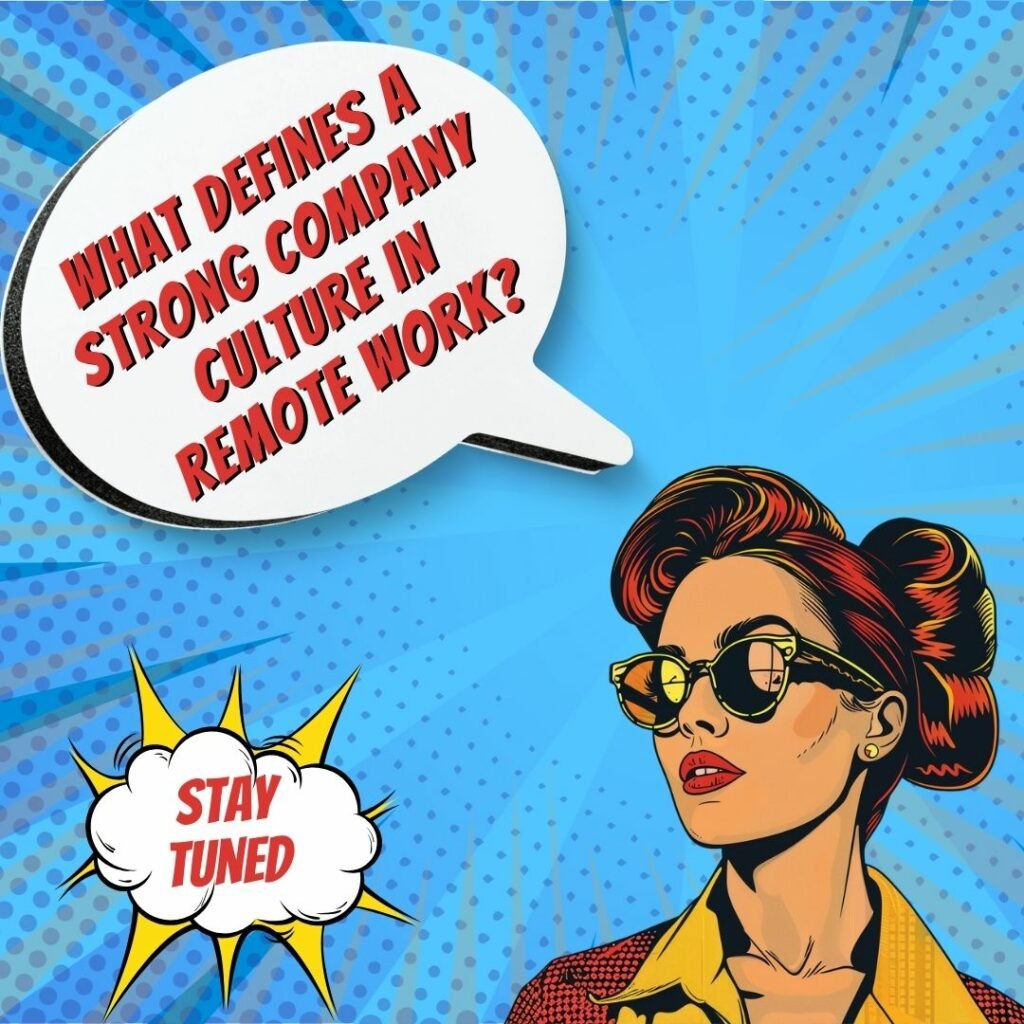Key Takeaways
✅ Establish a Remote-First Mindset: Shift your focus to remote work as the norm, allowing your team to excel anywhere.
✅ Foster Connection and Collaboration: Use virtual meetings, social events, and learning resources to bring your team together.
✅ Prioritize Work-Life Balance and Recognition: Promote flexibility, provide mental health support, and implement recognition programs to keep morale high.

Introduction
Have you ever wondered how some companies manage to keep their employees engaged and productive even when everyone is working remotely? The inability to see colleagues face-to-face has sparked debates about lost connections and decreased productivity. Despite doubts, a strong company culture can transform remote work from a challenge into an opportunity. Studies have shown that 56% of employees value work culture over salary, and businesses that nurture a strong culture see up to a 14% boost in productivity and an 81% drop in absenteeism.
With remote-first policies, asynchronous communication, and a focus on personal well-being, companies can bridge the physical gap and foster a deep sense of belonging. As you read on, prepare to uncover actionable insights into building a thriving remote work culture that transcends borders and keeps your team motivated and connected.
Top Statistics
| Statistics | Insight |
|---|---|
| 83% of US employers believe remote work is successful. This is compared to 71% of US employees. | This preference highlights the overall positive attitude towards remote work by employers, providing ample opportunity to enhance remote work culture. |
| By 2025, 22% of the American workforce will be remote. This equates to 32.6 million Americans. | With significant growth expected in the coming years, companies must prepare robust remote work policies and culture-building strategies. |
| 73% of executives believe remote workers pose a greater security risk. | Security concerns are a major barrier to remote work adoption. It's vital to implement strong cybersecurity measures. |
| 60% of companies use monitoring software to track remote employees. | While intended to ensure productivity, over-monitoring can affect employee trust and satisfaction. Balancing supervision with autonomy is crucial. |
| 81% of remote workers check work emails outside of office hours. | This statistic indicates the blur between work and personal life. Clear boundaries and guidelines are essential to prevent burnout. |
Understanding Remote Work Culture
Building a strong remote work culture is more than just offering remote positions; it's about creating an environment where remote employees feel genuinely connected and valued. This reality hinges on principles like asynchronous communication and ownership, enabling flexibility and balance for team members. Companies with a remote-first mindset transcend geographical and time zone constraints, underpinned by values like trust, inclusivity, autonomy, and transparency.
The Importance of a Strong Remote Work Culture
In today's evolving work landscape, 56% of employees consider work culture more critical than salary. A robust remote work culture isn’t simply a perk; it translates into tangible benefits such as a 14% increase in productivity and an astounding 81% decrease in absenteeism. These statistics highlight the vital role a well-crafted culture plays in fostering committed and efficient teams.
Key Elements of a Strong Remote Work Culture
For a remote work culture to thrive, enabling asynchronous work is fundamental. This approach allows employees to manage their tasks without the need for constant real-time collaboration. Additionally, a transparent remote work policy is crucial to ensure guidelines are clear and fairly applied across the board. Respecting the obligation to disconnect ensures employees' work-life balance by honoring their right to time off. Senior managers leading by example by working remotely helps to avoid proximity bias and sets the appropriate tone for the entire company.
Supportive Practices for Building a Strong Company Culture
Aligning daily work responsibilities with the larger company culture helps employees feel invested in their roles. Companies that embrace new work models and continually refine their processes to fit changing landscapes often thrive. It is also essential to revisit and revise processes with input from employees, ensuring that these align with company values and contribute to a sense of ownership and commitment.
Examples of Successful Remote Work Cultures
IBM emphasizes the importance of communication, collaboration, and employee engagement to ensure its remote workforce feels connected and appreciated. Meanwhile, Alibaba has invested heavily in technology to support hybrid and remote models, leading to increased productivity and satisfaction. Slack fosters a sense of community through virtual watercooler moments, encouraging non-work-related conversations to build camaraderie among team members.
Investing in Remote Team Culture
Remote work offers access to a globally diverse talent pool, allowing companies to tap into a wide range of skills and experiences. Investing in People Ops—dedicated teams focused on culture and employee engagement—is crucial. The return on this investment is most clearly seen in retention and engagement metrics, which measure the impact of cultural initiatives on employee loyalty and performance. This strategic focus ensures that the company not only attracts top talent but also retains it, fostering a dedicated and motivated team.
AI Marketing Engineers Recommendation
Recommendation 1: Foster Open Communication through Digital Platforms: Emphasize building a strong company culture in a remote work environment by using digital tools to promote transparent and frequent communication. According to a 2021 survey by Buffer, 20% of remote workers named communication/collaboration as their biggest struggle. Implement platforms like Slack or Microsoft Teams to create virtual spaces where employees can freely share ideas and updates. This approach not only keeps everyone informed but also cultivates a sense of unity and accessibility.
Recommendation 2: Cultivate a Sense of Belonging with Virtual Team Building Activities: Building a strong company culture in a remote work environment often hinges on establishing strong personal connections among team members. Virtual team-building activities have become a mainstay, with 65% of companies increasing their investment in such events since the pandemic, as reported by the Society for Human Resource Management (SHRM). Organize regular online social events, such as virtual coffee breaks, trivia games or book clubs, to nurture camaraderie and reduce feelings of isolation amongst employees.
Recommendation 3: Implement Recognition Programs to Boost Morale: Recognition is a cornerstone of building a strong company culture in a remote work environment. Utilize tools like Bonusly or 15Five to establish a structured employee recognition program. These platforms allow peers to acknowledge each other’s contributions in real time, fostering an atmosphere of appreciation and motivation. Research by Gallup has shown that regular recognition increases employee engagement by up to 21%, which is crucial for maintaining morale in a remote setting.
Relevant Links
- Transform Your Marketing with Advanced AI Solutions
- Master Key Factors for Effective Campaign Goals
- Boost Visibility with SEO-Optimized Titles
- Drive Campaign Success with Ad Metrics
Conclusion
Building a strong company culture in a remote work environment is not just a necessity; it's an opportunity to reshape the way we connect and collaborate. By prioritizing communication and transparency, businesses can transcend geographic boundaries, ensuring that all employees feel a deep sense of belonging and ownership. With a notable 56% of employees valuing work culture over salary, a robust remote culture isn't just beneficial—it's vital. Implementing practices like enabling asynchronous work and respecting the obligation to disconnect not only heightens productivity but also fosters trust and autonomy.
The examples of forward-thinking companies such as IBM, Alibaba, and Slack illustrate the successful adoption of remote work cultures. These companies have embraced adaptive models, emphasizing employee engagement and the integration of company values into daily tasks. As we navigate an ever-evolving work landscape, investing in remote team culture offers access to a global talent pool and improved retention and engagement.
In this new era, committing to building a strong remote work culture can ultimately create a more inclusive, productive, and engaged workforce. Companies should continue to revise and adapt their strategies, always keeping employee input and well-being at the forefront. How is your organization readying itself to lead in this remote-first world?
FAQs
Question 1: What are the key challenges of managing remote teams?
Answer: Communication, trust, and engagement are common challenges. Address these by prioritizing open communication, establishing clear expectations, and fostering a culture of trust and collaboration.
Question 2: How can I effectively manage virtual teams across different time zones?
Answer: Establish clear communication protocols, use scheduling tools, encourage flexibility, and provide resources to help team members manage time zone differences.
Question 3: What are some best practices for managing virtual teams in the long term?
Answer: Foster a culture of trust and collaboration, use technology to facilitate communication, provide resources and support, and encourage continuous improvement and innovation.
Question 4: How can I ensure remote employees feel included in team decisions?
Answer: Regularly ask for their input, ensure they receive key information in a timely manner, and provide opportunities for them to share their ideas and opinions.
Question 5: What tools can I use to improve remote collaboration and communication?
Answer: Utilize video conferencing tools, project management software, and online chat apps to facilitate communication and collaboration.
Question 6: How can I maintain a positive and inclusive atmosphere in a remote work environment?
Answer: Prioritize open communication, provide resources and support, and encourage active participation and engagement in virtual meetings.
Question 7: What questions should I ask remote employees to better support them?
Answer: Ask about their favorite parts of remote work, what they want to learn more about the company, and how they feel about the company's support for remote staff.
Question 8: How can I ensure remote employees have the necessary equipment and tools?
Answer: Ask candidates what they need from the company to do their best work remotely and ensure they have the necessary hardware and software.
Question 9: What are some effective strategies for building bonds and connections among remote team members?
Answer: Pair team members for tasks, set up peer-to-peer one-on-ones, and organize team-building activities to improve relationships.
Academic References
- Gallup Study. (2019). State of the American Workplace. Gallup, Inc. This study found that teams with a strong work culture experienced a 14% increase in productivity and an 81% decrease in absenteeism.
- Glassdoor Survey. (2019). Glassdoor's Mission & Culture Survey. Glassdoor, Inc. The survey revealed that 56% of employees prioritize work culture over salary, highlighting the importance of a strong work culture in employee satisfaction.
- Harvard Business Review. (2021). How to Build a Strong Remote Work Culture. Harvard Business Publishing. This article emphasized the need for companies to adapt their corporate culture to a hybrid work environment, focusing on communication, collaboration, and employee engagement to foster productivity and innovation.
- Forbes. (2022). Remote Work Reinvented: Supporting Hybrid Managers. Forbes Media. The article highlighted the importance of aligning daily work with company culture, providing organizational support for remote and hybrid managers, and embracing new technologies and workplace models to drive adaptability and creativity.
- Forbes. (2023). The Future of Remote Work: Integrating It into Company Culture. Forbes Media. This article stressed the significance of making remote work an integral part of a company's values, goals, and practices, including enabling asynchronous work, having a transparent remote work policy, and respecting the right to disconnect.












